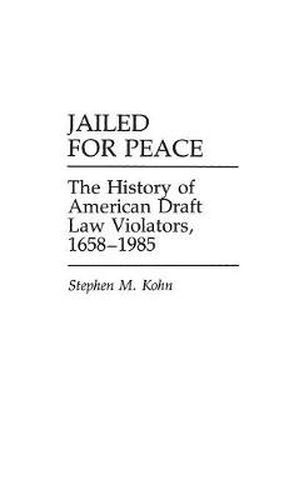Readings Newsletter
Become a Readings Member to make your shopping experience even easier.
Sign in or sign up for free!
You’re not far away from qualifying for FREE standard shipping within Australia
You’ve qualified for FREE standard shipping within Australia
The cart is loading…






In this first comprehensive treatment of the subject, Stephen Kohn presents an accessible, clearly written survey of draft resistance in America and its implications for constitutional democracy, domestic and foreign policy, social change, and the movement for world peace. The author explores the roots of the pacifist view and the first expressions of resistance that surfaced during the colonial period. He describes the incidence of draft resistance through the time of the Civil War and how it related to abolitionism. Following the modern conscientious objector through two world wars, Kohn comments on the view of pacifists during popular wars as little better than traitors and on their brutal treatment. Examining the growth of the movement during the Cold War, he addresses the major shift in public attitude that expanded the movement’s base of popular support and swelled the ranks of resisters. Draft resistance was to have its greatest impact, however, during the Vietnam War and its aftermath, in influencing public feeling about the war, thwarting the Selective Service’s induction efforts, and creating a climate of opinion that contributed to the government’s decision to abandon the draft early in the 1970s.
$9.00 standard shipping within Australia
FREE standard shipping within Australia for orders over $100.00
Express & International shipping calculated at checkout
In this first comprehensive treatment of the subject, Stephen Kohn presents an accessible, clearly written survey of draft resistance in America and its implications for constitutional democracy, domestic and foreign policy, social change, and the movement for world peace. The author explores the roots of the pacifist view and the first expressions of resistance that surfaced during the colonial period. He describes the incidence of draft resistance through the time of the Civil War and how it related to abolitionism. Following the modern conscientious objector through two world wars, Kohn comments on the view of pacifists during popular wars as little better than traitors and on their brutal treatment. Examining the growth of the movement during the Cold War, he addresses the major shift in public attitude that expanded the movement’s base of popular support and swelled the ranks of resisters. Draft resistance was to have its greatest impact, however, during the Vietnam War and its aftermath, in influencing public feeling about the war, thwarting the Selective Service’s induction efforts, and creating a climate of opinion that contributed to the government’s decision to abandon the draft early in the 1970s.